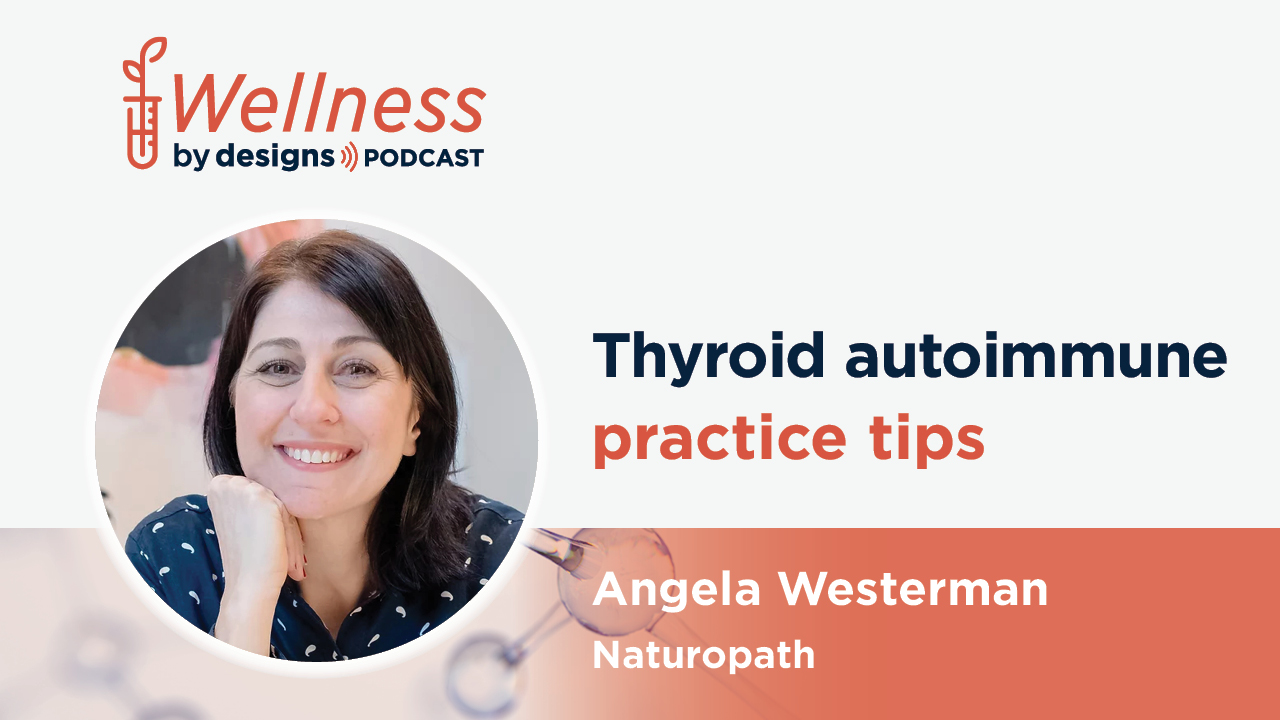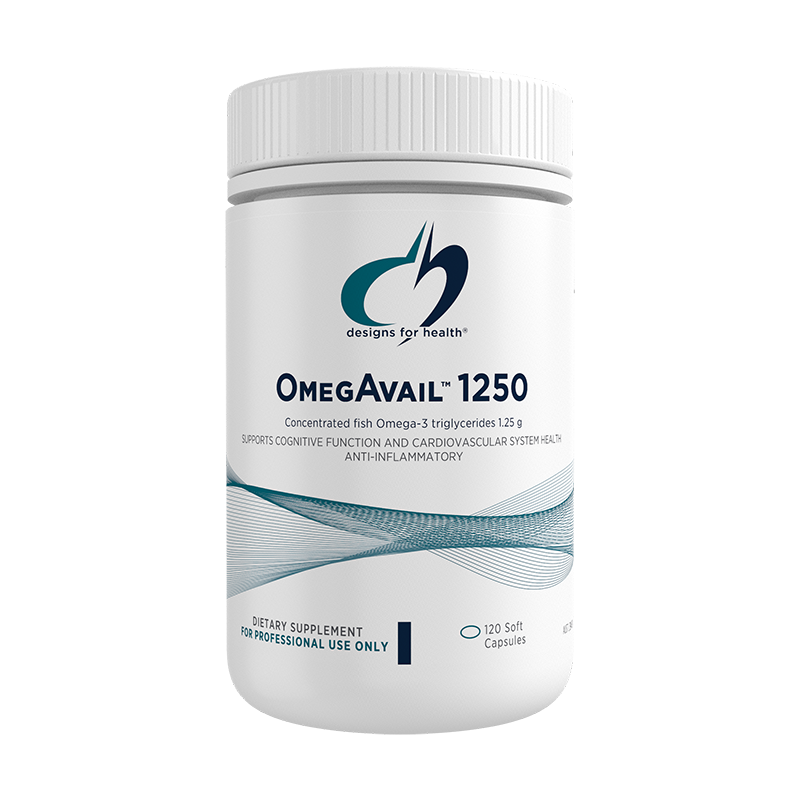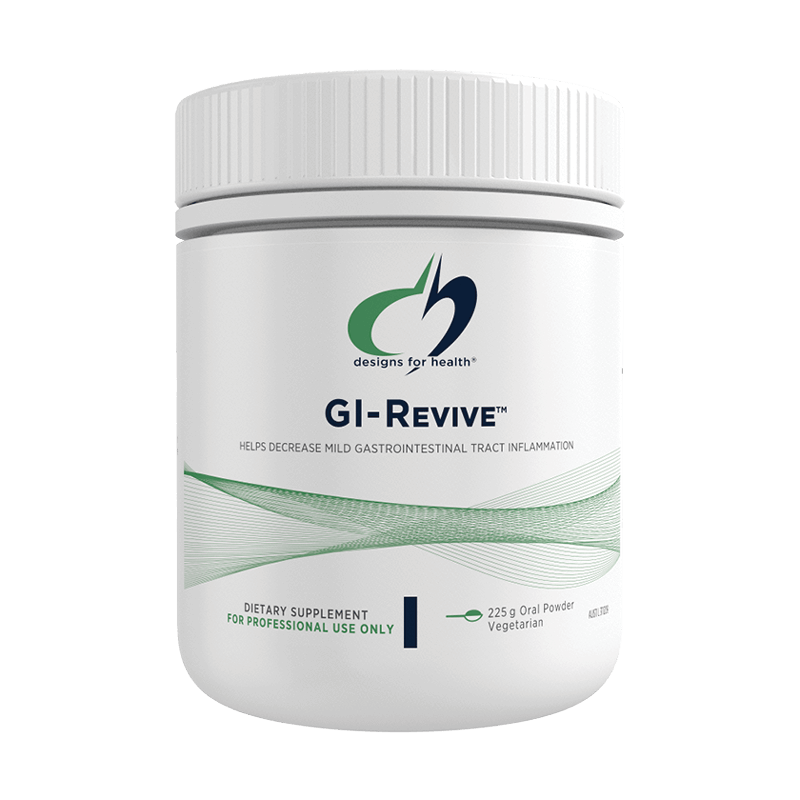

Angela Westerman is joining us today, and we’re discussing practical tips and information regarding the Thyroid autoimmune connection.
In this episode, Angela discusses:
- How patients present
- Why patients often have more than one autoimmune condition?
- Where to start with treatment?
- How to set treatment goals, and how often do you revisit these with patients?
About Angela:
I am a passionate naturopath, nutritionist and herbalist. I have worked in clinical practice for over eight years.
My holistic approach focuses on long-term customised health solutions for my clients in areas of thyroid dysfunction, adrenal fatigue, stress, digestive issues, hormone imbalance, sleep disorders and children’s immune health. I have a special interest in thyroid autoimmune disease, as I have this condition myself. As part of my case taking, I utilise GI Map Test, and blood and hormone testing.
My consultations include diet and lifestyle recommendations, herbal medicines and supplements.
Connect with Angela:
Website: www.angelawestermannaturopath.com.au
References:
Hashimoto’s Dietary Management:
Krysiak R, Szkróbka W, Okopień B. The Effect of Gluten-Free Diet on Thyroid Autoimmunity in Drug-Naïve Women with Hashimoto’s Thyroiditis: A Pilot Study. Exp Clin Endocrinol Diabetes. 2019 Jul;127(7):417-422. PMID: 30060266
Abbott RD, Sadowski A, Alt AG. Efficacy of the Autoimmune Protocol Diet as Part of a Multi-disciplinary, Supported Lifestyle Intervention for Hashimoto’s Thyroiditis. Cureus. 2019 Apr 27;11(4):e4556. PMID: 31275780
Nutritional Medicine:
Liontiris MI, Mazokopakis EE. A concise review of Hashimoto thyroiditis (HT) and the importance of iodine, selenium, vitamin D and gluten on the autoimmunity and dietary management of HT patients. Points that need more investigation. Hell J Nucl Med. 2017 Jan-Apr;20(1):51-56. PMID: 28315909
Hu S, Rayman MP. Multiple Nutritional Factors and the Risk of Hashimoto’s Thyroiditis. Thyroid. 2017 May;27(5):597-610. PMID: 28290237
Rayman MP. Multiple nutritional factors and thyroid disease, with particular reference to autoimmune thyroid disease. Proc Nutr Soc. 2019 Feb;78(1):34-44. PMID: 30208979
Nettore IC, Albano L, Ungaro P, et al. Sunshine vitamin and thyroid. Rev Endocr Metab Disord. 2017;18(3):347-354. PMID: 28092021
Simsek Y, Cakır I, Yetmis M, et al. Effects of vitamin D treatment on thyroid autoimmunity. J Res Med Sci 2016;21:85. PMID: 28163731
Chaudhary S, Dutta D, Kumar M, et al. Vitamin D supplementation reduces thyroid peroxidase antibody levels in patients with autoimmune thyroid disease: An open-labeled randomized controlled trial. Indian J. Endocrinol. Metab. 2016;20:391–398. PMID: 27186560
Krysiak R., Szkróbka W., Okopień B. The effect of vitamin D on thyroid autoimmunity in levothyroxine-treated women with Hashimoto’s thyroiditis and normal vitamin D Status. Exp. Clin. Endocrinol. Diabetes. 2017;125:229–233. PMID: 28073128
Herbal Medicine:
Farhangi MA, Dehghan P, Tajmiri S, et al. The effects of Nigella sativa on thyroid function, serum Vascular Endothelial Growth Factor (VEGF) – 1, Nesfatin-1 and anthropometric features in patients with Hashimoto’s thyroiditis: a randomized controlled trial. BMC Compl Altern Med. 2016 Nov 16;16(1):471. PMID: 27852303
Chen F, Kawashima A, Luo Y, et al. Innate Immune-Modulatory Activity of Prunella vulgaris in Thyrocytes Functions as a Potential Mechanism for Treating Hashimoto’s Thyroiditis. Front Endocrinol (Lausanne). 2020 Nov 16;11:579648. PMID: 33304319
Chen P, Li C, Zhao S, et al. Effect of large dosage of Prunella on Hashimoto’s thyroiditis: A protocol of systematic review and meta-analysis of randomized clinical trials. Medicine (Baltimore). 2020 Dec 11;99(50:e23391. PMID: 33327264
Dolan K, Finley H, Gasta M, et al. Managing Hashimoto’s Thyroiditis Through Personalized Care: A Case Report. Altern Ther Health Med. 2018 May;24(3):56-61. PMID: 29428930 (Full Free Text: https://todayspractitioner.com/wp-content/uploads/2018/08/hashimotos_alt-therapies-.pdf)
Thyroid Antibodies and HLA (& other) genetic association:
Fröhlich E, Wahl R. Thyroid Autoimmunity: Role of Anti-thyroid Antibodies in Thyroid and Extra-Thyroidal Diseases. Front Immunol. 2017 May 09;8:521. PMID: 28536577
HLA DQ 2/8 association:
Freeman HJ. Endocrine manifestations in celiac disease. World J Gastroenterol. 2016 Oct 14;22(38):8472-8479. PMID: 27784959
Possible Association of HT with TNFAIP3 (aka HA20):
Hori T, Ohnishi H, Kadowaki T, et al. Autosomal dominant Hashimoto’s thyroiditis with a mutation in TNFAIP3. Clin Pediatr Endocrinol. 2019; 28(3): 91–96. PMID: 31384100
Transcript
Introduction
Andrew: This is “Wellness by Designs.” And I’m your host, Andrew Whitfield-Cook. Joining us today is Angela Westerman, a naturopath, nutritionist, and herbalist. And today we are gonna be discussing the more practical tips and information regarding thyroid autoimmune disease. Now, do forgive us, we weren’t able to bring you video today because of the recent weather that Sydney’s had, but I would like to welcome you, Angela, to “Wellness by Designs.” How are you?
Angela: Thank you, Andrew. I’m well, thank you. Thanks for having me.
Andrew: It’s a pleasure. Now, firstly, can you take us a little bit through your career and why the keen interest in the connection between the thyroid and autoimmunity?
Angela: Yeah, sure. So, I’ve been in clinical practice for a little over eight years now. I previously had a corporate job, and I started off once I’d finished my naturopathy degree, I’d had three children, and I started off in a clinical setting, where there was a kind of a health food facet to it as well. I then moved into a more specific, worked for a thyroid clinic in the city for a short space of time, about a year or so, and then I basically just went out on my own in clinical practice, and now I work from my house in a studio. I’ve got three young kids, so the flexibility of that is really great. And the interest in thyroid and autoimmune really comes from my own personal health journey. As a child, I had quite poor immunity, I could recount all the names of the antibiotics pretty much by the age of about seven. I had chronic tonsillitis, ear infections, and so forth. And so, I knew that obviously, things weren’t right for me back then. So, I think that has led me as an adult to practice naturopathy, and then coincidentally with my third pregnancy, I was diagnosed with autoimmune thyroid disease. So, Hashimoto’s.
Andrew: Gotcha. You know, it’s really interesting how, what we’re learning now about, you know, the first thousand days or more than that, but these poor kids that have to have recurrent antibiotics because medicine has nothing else up their sleeve. It’s really interesting what we are learning about at least trying to return some form of balanced microbiota milieu in between causes of antibiotics. It’d be interesting to see if anybody’s done some research on those who don’t get any intervention with probiotics and those who do. Have you ever heard of anything like this?
Angela: Look, I know that now it’s quite good with, you know, antibiotic treatment in children. There are quite a few GPs that will prescribe a probiotic with it. I think those GPs are rare, but I know that there must be some information around that. And also even in pregnancies, there’s lots of research around even, yeah, in vitro taking a good probiotic for mom, which will then help the child’s gut microbiota before they’re born. But I think for me, definitely all those antibiotic, there was definitely no probiotics back then.
Andrew: Yes. You know, it’s a really interesting conundrum, this giving a probiotic though, which is bacterial in nature when you’re taking an antibiotic. So, you sort of kill, replace, kill, replace. What’s your thoughts on that?
Angela: Yes. Look, I think that that doesn’t really work well because compliance would be low on that, it’s also not cheap to constantly do an antibiotic and then a probiotic. You know, I guess if you give a good SB, that can be helpful but yes, I’m sure that we could be doing a hell of a lot more.
Andrew: So, for those of you who aren’t Australian, Australians will always shorten a name. So, when we say SB we’re talking about Saccharomyces boulardii. It’s okay, Angela, we know it. It’s probably worldwide now, it’s just this acronym that people use.
Angela: My apologies.
Andrew: So, let’s delve further into your patients with thyroid issues and autoimmunity issues. How do they present? Do they all come to you with a clear diagnosis, or do you have to really be a detective here?
Angela: Yes. Look, it’s really broad as to how some people present. I treat mainly women in the sort of 25 to 55-year-old age group, and they do see that I’ve got an interest in thyroid autoimmune, so they’ll come perhaps, you know, 50% of the time they’re coming specifically for that, but then other times it’s hormonal issues, digestive issues, etc. But the thyroid-specific people and usually they’re underactive, they present quite, I don’t know, there’s a pattern in how they present. Usually, you can sort of pick them from like, as soon as you lay eyes on them, they kind of, they’re a little bit slower in their walk, they might be a little bit hunched. Generally, their skin doesn’t look bright, and what else can I think of? Their tongue is usually quite scalloped, which when you’re talking to them you can see that, but then there’s also other issues that they’ll present with. It’s never just, “My thyroid doesn’t work properly, you know, I’ve had a blood test and I’ve been diagnosed with hypothyroidism.” There’s always, it’s multifactorial. So, for example, things I mentioned, their periods will be out of whack, or their digestive system doesn’t work properly. So, they do present quite differently, but then their symptoms are quite broad and could cover quite a few diseases, I guess.
Andrew: Yes. You know, when you’re looking at a textbook and you’re thinking about hypothyroidism, there is that slow metabolism picture. Everything is slow. The thyroid governing the rate and rhythm of every single cell in the body. But with Hashimoto’s, we don’t see this though. We see thinner women, for instance, we see thinner women as well. Are these women who are just worn out?
Angela: Yes. Look, I wonder whether they’ve just got this amazing, you know, ability as women do to just soldier on and kind of just, you know, run, I don’t know, without much energy and just their body gets used to it, which is obviously not good for their adrenals. But I think they just push through and it becomes their new normal of, you know, having to survive that way, and they just get on with it, I think. And some, I guess will look after themselves a bit more if they know that, you know, they’re compromised, their immune systems are compromised in some ways, they might, might being a big might, do other things to try and compensate for that, you know, by eating well, or trying to get more sleep, or those sorts of things.
Andrew: So, they are the healthy options. What about the stimulants, like overuse of coffee, you know, burning the candle at both ends and?
Angela: Absolutely. And just going, “Well, you know what, I’m tired or I can’t lose that weight, so I’ll just not eat well, or I’ll stay up a bit more, or I’ll just, you know, I’ve got a stressful job and I need to push through, so I’m just gonna go for the biscuits and that.” That’s obviously the more likely scenarios, you know, but those people have low mood and then you’re dealing with the mental as well. So, it’s multifactorial in how you have to treat and it depends on what they present with. I think sometimes you park the thyroid bit, and then you treat the greater symptoms, for example, the stress or the fatigue, or the digestive issue. And you get on top of that, and then, you know, then you move on with all your thyroid support.
Andrew: Gotcha. So, you’ve actually answered my next question. That was, how do you prioritize it? Because, you know, as you know the thyroid is the governing gland, if you like, of rate and rhythm. But of course, you’ve got these real issues, like for instance, your thyroid adrenal, HPA axis, all of that sort of HPA axis which throws everything out of whack, and it’s a real trick as to where to intercede. So, do you help sort of with more nourishment, more support first?
Angela: Yeah. Definitely with autoimmune stuff, then you definitely look at, you know, eliminating gluten, so you’ll always have diet areas where you need to improve. And then you also need to, you know, talk to the patient about not just not eating gluten but then eating well. So, I always start with that, you know, “What does your diet look like?” And, you know, it’s amazing what people think is a healthy diet, and then there’s definitely, I totally prioritize, yeah, the sleep or the stress, make sure that I can get that working better for the patient because then they’re more likely to come back, and they’re more likely to be compliant when they see results. And then if you explain that it is, you know, will take a bit of time to bring it all back into balance, they’re usually pretty good with, you know, staying on track.
Andrew: You said a really interesting and useful thing there, Angela. And that was, you ask your patients, instead of saying, “What is your diet like?” Which we hear so many practitioners ask their patients, you said, “What does your diet look like?” Which now asks them to paint a picture to you. Do you find that…like, is that a chosen word?
Angela: No. I actually never thought about how I asked that question, but I guess it’s very valid. I do always preface no judgment, please be as honest and, you know, as…yeah, give me all the details. And they’re usually pretty honest about what they’re eating and, you know, I always, “How much water are you drinking?” I think the standard answer is pretty much not enough. So, you know, I think if you can, I don’t know, make them feel comfortable and going in a very nonjudgmental way, you’re probably gonna get as honest an answer as you’re gonna get.
Andrew: Gotcha. And you also mentioned your demographic that you look after 25 to 55 years, mainly female. So, I’ve got to ask this question. We’re talking stressors being a major trigger for autoimmunity, any autoimmunity, let alone thyroid disease, but pregnancy. I mean, there’s a stressor, particularly multiple pregnancies.
Angela: Yeah, that’s right. That’s right. And, you know, you’ve got all those hormones doing their thing at various different stages, stressful jobs, families, it’s a lot for, you know, but that is the perfect age group for a storm to brew, right?
Andrew: So, with regards to initiating therapy, do you bring partners in and say, “Look, this is what the goal is, you know, stress is a big factor, lift your game son.” Or maybe not so, but do you help men understand how they can support women just by simple things like…And I’m putting my hand up here as guilty, Mr. Guilty. Like, my wife is so strong. She actually… Yeah, I won’t get off on praisingly too much, but she’s an incredible woman, but, you know, she’s looking after another child, she does so much and I’m constantly amazed at her energy.
Angela: Yes. Look, I think it’s just innate in women. I mean, they’re just incredible beings and they can [crosstalk 00:13:33] I mean, you know, amazing. You can hold a baby, and birth a baby, and, you know, grow a baby, and all those things pretty amazing, and that’s just the baby part. And then you’ve got all the other bits, you know. But I think with the partners, it is actually a question that I ask of patients who are married, in a relationship, what support do you get from your partner in terms of what it is that is their issue? So, you know, “Look, I really desperately need to go gluten-free, is your partner on board?” “Work is stressful, I’ve got a stressful, you know, parent situation.” “Okay, then is your partner supportive?” And most of the time you do get yes, and then sometimes you get a no, and then that’s tricky, then you just have to support them a bit more and maybe you check in with them a bit more, you know, than you otherwise would.
Andrew: Gotcha. Nice. All right. So, patients who have one autoimmune issue very often have more than one. What do you find other most common comorbidities with autoimmune thyroid disease?
Angela: Yes. Okay. So, there’s loads of…oh, loads, there is research to show that Epstein-Barr virus can play a role in the development of autoimmune diseases, because the ability to modify that host immune response and, you know, unfortunately, Epstein-Barr’s lifetime presence in the body. And that’s definitely considered a contributory factor to, or for the development of autoimmune thyroid disease, and those autoreactive B cells that can save the thyroid gland and then produce autoantibodies. So, there’s definitely a link of even just the Epstein-Barr virus and autoimmune thyroid disease, I am actually a perfect example of that because on all my bloods now I’ve got Epstein-Barr virus detected, but I’ve never actually been diagnosed with it as a child or as an adult. So I’ve obviously had the virus, but never actually… And so some people will say that’s worse because you’ve obviously then pushed through, you know, the virus without resting which is also problematic. So, I think for me that was definitely my trigger for, you know, getting Hashimoto’s later on or whenever it was that I’d had the Epstein-Barr.
And there’s also an increased prevalence of celiac, the link between celiac disease and autoimmune thyroid disease because they share that similar HLA. So, they’re definitely two that I think that I see a link mostly with autoimmune thyroid disease. And then once, you know, your body has been tricked into not really understanding what’s the healthy tissue and what’s the unhealthy tissue, then I think you’re kind of on a bit of a downward spiral. It just depends what you do from here, as to what happens with your health as time goes on.
Andrew: Right. So, let’s talk about therapy, where do you initiate therapy? You’ve said nourishment. Do you always tend to sort of favor, you know, these sort of worn-out adrenals? And I should preface that with that, there’s a lot of controversy over the words, adrenal fatigue, whether it’s just fatigue in the brain, but the treatment remains the same. So, whatever term we’d like to use for it, what do you use, what do you tend to favor?
Angela: Yes, sure. So, do you mean treatment in terms of testing, or treatment in terms of supplements?
Andrew: Well, let’s talk about testing first. How do you assess patients?
Angela: Yes, sure. So, definitely, you’ve got two sets of patients, one that’ll come in with all their bloods handy or they’ve already done their blood tests, or they’ve already, you know, had a colonoscopy or an endoscopy, then you’ll have some people that come in and they just feel rubbish, and their doctors told them that their blood is fine, you know, my thyroid’s working fine. So, then I’ll try and get a hold of them, make sure that when they’re talking about their thyroid being fine, that it’s not just that’s been tested, which is usually the case. So, I’ll try and get a full panel of bloods for thyroid, which is your TSH, T4, T3, and all your thyroid antibodies, that then gives you a very clear picture of what’s going on. And then you’ve got all the other bloods as well, urine, your Bs, your vitamin D, and then you do your cholesterol, all those things, which all play a part, your blood sugar levels.
And then, actually, I have been really loving doing stool testing as well, I think that’s been really useful for patients, you know, sometimes there’s, or obviously, it’s not just thyroid stuff there, there could be other underlying digestive issues. So, I’ve been using that a little bit more, there’s a really great comprehensive test that I use that would test for pathogens, and opportunistic organisms, and good flora, and not-so-good flora. So, you get a really great indication of what bacteria, viruses, parasites, etc., might be lurking. And then I’ve done some saliva, you know, hormone and cortisol things as well, generally, not so much of that because that one’s quite clear, the cortisol you can spot a stressed out patient a mile away.
Andrew: Gotcha. And so, other treatments as we sort of went on with nourishment and things like that, where do you start?
Angela: Okay. So again, it’s very individual depending on the patient. I guess if I had, you know, you get these patients and the thyroid might be the underlying thing, but then the insomnia is more prevalent, in which case then, I would start with like a really nourishing magnesium powder with some lavender, etc., to help them there. And then I can introduce the thyroid supplements, things like, you know, your selenium, zinc, magnesium, vitamin D, iodine, if they’re not Hashis, you know, tyrosine, then you’ve got your beautiful autoimmune herbs, Hemidesmus and Rehmanniae, anti-inflammatories are lovely, there’s some beautiful…there’s a great Turmeric product that’s got a high concentration of curcumin. I think it’s around 25 grams or 26 grams of curcumin rhizome per capsule, that works really beautifully but then you might, you know, if there’s thyroid with sluggish bowel, or bloating or discomfort, then I will start with a beautiful gut powder, you know, something with glutamine, a really good dose of glutamine, and zinc for the integrity of the gut because [inaudible 00:21:11]. So, I don’t think any patient is…have I ever prescribed one, you know, similar, or it’s a similar treatment plan but it’s never the same.
Andrew: Something you said earlier before with regards to testing. One thing that stuck out to me there was vitamin D. I’m not necessarily a fan of testing a lot at least, but certainly where there’s an indication of a potential vitamin D deficiency. But what interests me is regards to treatment with regards to vitamin D, and vitamin A, that FOXP3, that sort of Yin and Yang complement between vitamin A and vitamin D with the immunity of the gut that’s got to do with CD4, CD25 stuff, and basically T regulation in the gut. And you were mentioning your story about multiple courses of antibiotics?
Angela: Yes.
Andrew: Man, this goes way back there.
Angela: Oh, yeah. We are talking from, you know, the very onset of, you know, maybe being breastfed very briefly and then onto either formula and diluted milk, like before, you know, from about six months of age. I mean, that is just to want shreds off, I can’t and it will never, you know, it will never be the same. And hence my story of ill health from very young to even now, when I’m still trying to work out, you know, why I don’t absorb iron and why things are a little bit trickier and it all goes back to the gut, for sure. So, you know.
Andrew: You know, it’s coming up more and more nowadays, and not so before this malabsorption of iron, this real issue. And it seems to have a greater preponderance for women. I don’t know if it’s a biased sample I’m seeing, but it’s incredible.
Angela: Yes, absolutely. And it’s not, you know, do you have heavy periods? Do you eat meat? I think we’ve got to get past that, which is something that GPs always flag. And I guess, you know, it’s the first pot of cold shower, but I think I was anemic from maybe 16, and not with heavy periods or anything like that, but it took until I was probably almost 40 for a hematologist to take it seriously and go, “Right, why is this happening? Why can’t we?” And it’s definitely gut, it’s definitely gut-related.
Andrew: Yes. Gut absorption.
Angela: Yes.
Andrew: So, I’ve got to ask, what did this hematologist recommend?
Angela: Well, the hematologist recommended an iron infusion which went pretty badly, and I had a reaction and then had to have a whole bunch of cortisone, you know, pushed straight through in the same vein as the iron infusion. And it’s just too much for somebody who’s struggling to, you know, take that on. So, in hindsight, I never should have agreed to it but, you know, at the time I kind of thought my hands were a bit tied because also my hemoglobin was low. So, you know, you want to take their advice as much as you can, even though you know you’ve got some other things in your kit, but I definitely wouldn’t be doing an iron infusion again personally.
Andrew: Yes. It’s a hard walk that one, I wouldn’t like to be in their shoes because you’re wanting to rescue a patient who’s got, you know, an iron level through the floor, hemoglobin level through the floor, and yet, what else have they got? There’s no other rescue. It’s a hard one.
Angela: No, I mean, I’ve had some good results with a strategy of, you know, dosing high for one day and then skipping the next day and then dosing high again, that seems to work quite nicely, but it does take about six to eight weeks. And for some people, they don’t have the time or the compliance right now to get to do that, or no, that’s, you know, in terms of cost it’s not overly expensive, but for somebody who’s feeling pretty fatigued if they’ve been given that option to have a bit of a boost, then I guess people will take it. It’s just for me it didn’t work, and I had an anaphylactic reaction and I’m told not to do it again.
Andrew: Yes. So, can I ask further about that strategy? That’s really interesting because naturopathically, and there is some research showing that pregnant women might do better with a lower dose, more regular iron, rather than these high-dose iron sulfate preparations, which bounce down the gut and things like that. Can you tell us more about your strategy? Do you start off on a sulfate or do you use a different form of iron, and then how low do you go? What form do you prefer?
Angela: Yes. No, I think it is just a sulfate form, but it is…what is it? It’s about 24 milligrams in one. It’s about 24 milligrams in one capsule, that’ll be about that.
Andrew: That’ll be an OTC. I think the limit is 25 with over-the-counter in Australia, but they’re normally not the iron sulfate forms.
Angela: No, that’s right. It’s the iron bisglycinate, I think it’s around 24 milligrams per cap. And if I do a dosing, I don’t sort of start low, I just go straight in with two in the morning, two in the afternoon, and then a day off, and then two in the morning, two in the afternoon, and a day off, for about six weeks. And that’s been really great for many of my clients to get their iron levels up. It’s just whether they’re prepared to give it that time.
Andrew: Wow. That’s a really good strategy though. I like it because you’re giving the gut a breathing space in between.
Angela: Yes, that’s right. And it works well, and there’s lots of research in treating that way.
Andrew: Ah, okay. That’s brilliant. So, other treatments, now you’ve mentioned, you know, beautiful herbs there, some of those, particularly things like Rehmannia also have liver in support, and they’re an anti-inflammatory.
Angela: Which is correct.
Andrew: Yeah, that’s right. So, there’s this whole triad of these major controlling organs there, and this is what I like. Years ago, there was a company that sort of tended to compartmentalize thyroid, and I remember seeing patients all the time who just reacted with nausea and things like that because all they were doing was throwing things at the thyroid without supporting other things. And this is what I love what you are saying. So, when do you start to go? “Okay, now you’re ready for thyroid support.”
Angela: Yes. Okay. So, generally, it’s not that long into treatment, but it’s probably, you know, you wouldn’t go in first, you might go in four or eight weeks from there. So, you know, if the symptoms are mild or less chronic, then I guess you might just do like some gut support initially, or some sleep support or whatever it is, stress support. And then maybe in the second consult or the third consult, let’s say it’s for four to six weeks afterwards, that’s when I would say, “Okay, let’s start introducing these other supplements to then support the thyroid.”
Andrew: Gotcha. And do you use things like, you know, thyroid antibodies to govern how you change your therapy, or do you tend to think of even simple things like taking somebody’s temperature regularly, to look at how their thyroid is responding to therapy?
Angela: Yes. I mean, generally, they’re good, they can sort of tell you, I mean, sometimes you get good results quickly or it takes them a little bit more time to notice results. But generally, I just go in with some really nice supplements and also food and, you know, if thyroid antibodies are super high, then for some patients you say, “Cold turkey, no gluten, let’s go.” And for others, you have to say, “Look, let’s cut it out over the next two weeks. So, gradually reduce it.” It just depends on the patient’s personality and what you think they can manage. You don’t want them to run for the hills, so food is always definitely a base start and, you know, make sure there’s not those high goitrogenic you know, if they’re eating broccoli and cabbage and kale. Kale’s a terrible one, like for autoimmune thyroid people. So, it’s giving them some knowledge about that, and then giving them alternatives. So, I think if you do a lot of don’t do this, don’t do this, don’t do this, and don’t give alternatives, then I think you are probably gonna be in trouble. But if you say, really it’d be really great if you could be gluten-free, that’ll be beneficial for all these reasons, and here are some really great gluten-free products that you could try or, you know, do this instead of that. And they’re usually not so freaked out by that, they can usually manage it pretty well. Also, if you show them evidence that, you know, on a blood test or a stool test that your IgG or IgA is super high, then I don’t know, I find that any kind of pathology will help them to make the change rather than just being told.
Andrew: Yes. And I’ve got to ask, you’re mentioning foods there. I’m so glad you mentioned kale. I think it was WebMD, just put it onto the “Dirty Dozen” list. I personally think it’s far on the stick that…
Angela: I actually have never seen it on, right.
Andrew: Yeah. Not a favorite food of mine. I’m gonna be attacked by that, I know. But things like soy, you know, there was this period long ago, we’re talking about 15 years ago where soy was the magic thing. And I’m not saying it’s useless, I certainly use it in very few indications, but I do use it. But I, you know, I’ve seen people that had the soy breakfast, soy milk, soy chestnuts, soy this, soy that, soy meat substitutes, and they ended up with, you know, nodular thyroids and things like that. Do you still see this type of patient or is that soy era over?
Angela: I feel like the soy era is over because obviously I always ask about food in initial consults and very rarely do I hear somebody, you know, they say, “I have one coffee a day.” “Okay. Well, what milk is that?” Rarely is it soy. It’s either cow’s milk or it’s another nut or a non-milk oat or almond. People have, you know, kind of been hearing about soy and how it’s not as fabulous as it was made out to be all that time ago.
Andrew: Yeah. And now onto things like treatment goals for your patients. How do you set treatment goals when you know that stress is a major trigger, something that’s outside of your control, and yet you want to sort of see your patients get better within a certain time limit? What sort of things do you teach them?
Angela: Well, definitely I’m big on the, you know, supporting in terms of being positive. If you can, you know, one example, eliminate gluten, you will see that in a period of time your digestive system will improve or you will feel less sluggish or you will, you know, but you’ve gotta give them a timeframe. And so for gluten, I find it does take a good six weeks to start to notice any benefits. So, if you kind of upfront and say, “Look, you know, it’s gonna take this long for this symptom to improve, but your sleep should improve with this sleep powder, you really should notice effects quite quickly.” So, I always make sure there’s something that I give them that they will notice effects for, in a positive way quite quickly. So, that always helps compliance, and so it’s really then, you know, some patients…I’ve interchanged patients and clients, quite a bit, I’ve noticed, so apologies for that. I do find that patients can take, you know, you’ve gotta set three months for them to kind of see some improvements initially, but then with something like an autoimmune condition, it’s an ongoing thing. You’ve got to make some lifetime changes and lifestyle changes. And that’s just a fact for trying to keep yourself as well as you can, for as long as you can. So, it’s not that they need to come and see me for that period, but it does mean that, you know, let’s work at this for a few months, and generally you get really good results with patients if you can give it the time, but I’m always upfront about this isn’t a magic pill, this isn’t gonna…you take these pills for a week and you’ll be better.
Andrew: Yes, I know. One last question, Angela, and that is very commonly you’re dealing with more than one autoimmune disease when you’re dealing with thyroid autoimmunity. So, how do you set goals around that second, or possibly even third autoimmune condition with a timeline for them to respond? I mean, the patient wants to be vital tomorrow, but if they’ve got something like, let’s say rheumatoid, that’s an ongoing issue, that’s heavy-handed.
Angela: Absolutely. Yes. And so you have to tailor your treatment a little bit for those patients because you need to improve, you know, if it’s point pain or things like that. So you might, I mean, sort of your underlying treatment plan is the same with autoimmune protocols in terms of herbs and supplements and food, but then rheumatoid arthritis is a great one, you need to really get on top of the inflammation. So, then you might go heavier with the turmerics and the fish oils and that kind of thing, and make sure that at the next consult, they’ve seen some improvements in that, and then you keep going with your protocol is probably how I look at it. And then I guess they can get to a point where they might be able to reduce some of the things that they’re taking, or switch them out, or stop it for a period of time and see how they go, but for the most part, you know, they need some kind of support ongoing.
Andrew: Yes. For sure. I said last question, but I need to ask another one. And that is over time, obviously, you know, you’ve got a lot of experience in this area now. Over time, do you find that orthodox practitioners, once they can see that their patients are benefiting from changes and support, nourishing therapies that you give them, do you find that they slowly come on board with like, “Look, that’s not my bag, but okay?” Are you finding this slow acceptance?
Angela: Look, it’s probably very slow. Some people come to me and say, “Look, you know, my GP’s recommended that I try this.” But I still think that there’s camp A and camp B, and there’s not a lot of people from camp A coming over to camp B, but definitely more than say there was five years ago. And even when patients might say, look, I’ve mentioned what I’m doing with my GP and they didn’t roll their eyes or they said, “Okay, if that’s working for you then great.” But it would be really nice for there to be, you know, a closer link between, you know, orthodox medicine and what we do, because I think together you could do some really wonderful things.
Andrew: Yes. I hear you. Angela, thank you so much for taking us through what you do because of your journey, but how you care for your patients. I mean, there’s not just that personal expertise, but there’s obviously that care showing through about how you can, you know, wander down that path to health from where they are with their thyroid and other autoimmune disorders. Thank you so much for taking us through this today on “Wellness by Designs,” I very much appreciate it.
Angela: Thank you. It was my pleasure. Thank you for having me.
Andrew: And thank you, everyone, for listening to us today, and you can catch up on the show notes for today’s podcast and all the other podcasts on the Designs for Health website. I’m Andrew Whitfield-Cook, this is “Wellne








 Exploring Integrative Dentistry with Dr Ron Ehrlich
Exploring Integrative Dentistry with Dr Ron Ehrlich Essential Insights into Gallbladder Function and Care with Amie Skilton
Essential Insights into Gallbladder Function and Care with Amie Skilton Natural Strategies for Men’s Health with Naturopath Jason Mallia
Natural Strategies for Men’s Health with Naturopath Jason Mallia